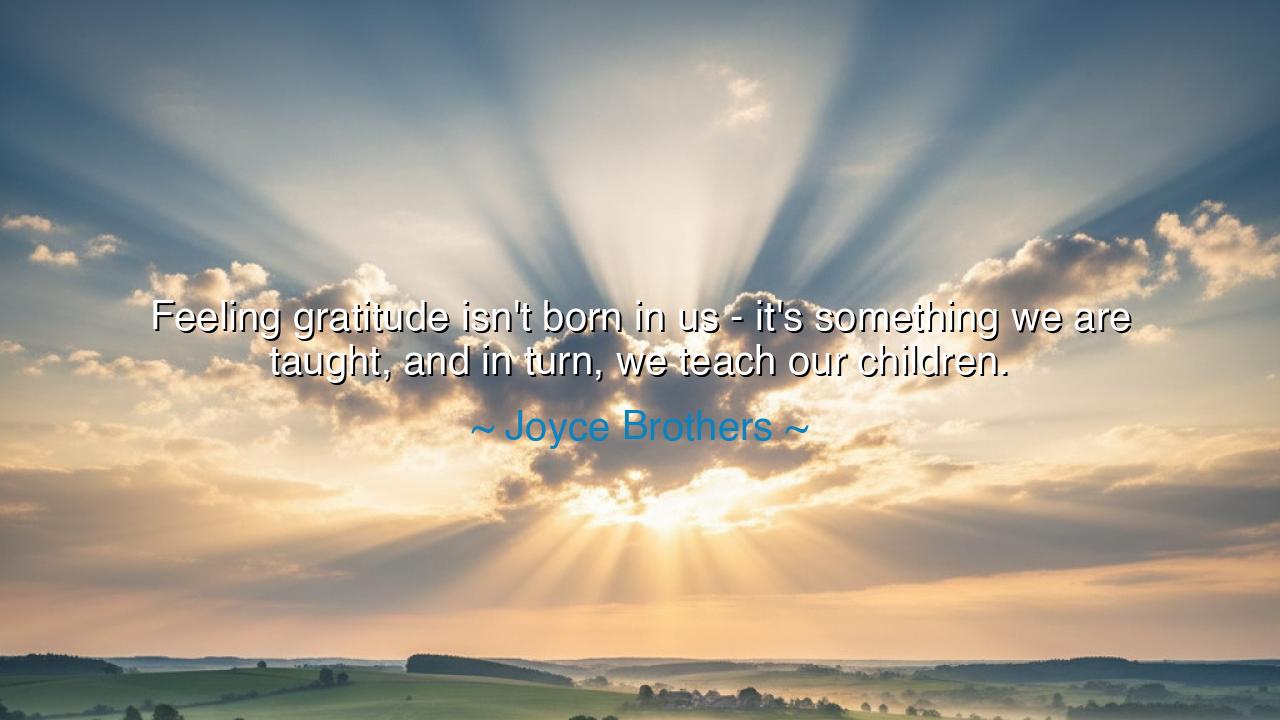
Feeling gratitude isn't born in us - it's something we are
Feeling gratitude isn't born in us - it's something we are taught, and in turn, we teach our children.






The voice of Joyce Brothers comes to us with the clarity of a sage: “Feeling gratitude isn’t born in us—it’s something we are taught, and in turn, we teach our children.” These words reveal a truth as ancient as humanity itself: gratitude is not a mere instinct, but a cultivated virtue. The newborn does not arrive in the world whispering thanks; it arrives crying for its needs. Gratitude must be shown, modeled, and passed down like a sacred inheritance, or else it withers and is forgotten.
To say that gratitude is taught is to say that it is a discipline, a chosen way of seeing the world. Left untaught, the human heart leans toward selfishness, toward believing that all good things are owed to us. But when a child is shown how to give thanks—by seeing their parents bow their heads in prayer, by hearing words of appreciation spoken aloud, by watching kindness honored in daily life—that child learns to look upon the world with reverence and humility. Thus, the family becomes the first temple in which the flame of gratitude is lit.
Consider the story of the Pilgrims in the early days of the American colonies. They endured hunger, death, and the bitter cold. Yet, after the harvest of 1621, they set aside days to give thanks—not only to God but in fellowship with the Wampanoag people who had aided them. This act was not instinctive but intentional, a chosen teaching for generations to come. Out of their hardship was forged a tradition of gratitude that has endured centuries, reminding a nation to pause and remember that abundance is never guaranteed, but always gift.
The ancients themselves also spoke of this truth. The Stoic philosophers taught their pupils to rehearse each day the blessings they had received, however small. The Hebrew psalmist sang, “Enter His gates with thanksgiving,” not because mankind was born thankful, but because the people needed to be instructed in the posture of gratitude. Everywhere in history, we see the same truth confirmed: gratitude must be taught, or it is lost.
Joyce Brothers’ words also remind us of the generational weight of our actions. If we model bitterness, complaint, or entitlement, our children will inherit those poisons. But if we model gratitude—if they hear us say “thank you” often, if they watch us appreciate both small mercies and great blessings—they will carry that light into their own lives and into the lives of those who come after them. Thus, gratitude becomes not only a personal virtue but a legacy.
The lesson is clear: if we desire a world more humble, more kind, more humane, we must teach gratitude with intention. Parents must speak thanks daily in front of their children. Communities must honor those who serve, not with silent assumption but with living acknowledgment. Leaders must not forget to recognize the sacrifices of those they guide. In this way, gratitude becomes the soil in which justice, humility, and compassion grow.
Practically, let us each take up the discipline of teaching gratitude by example. Begin each day by naming aloud something for which you are thankful, and end each evening by doing the same. Write letters of thanks, not only when great gifts are given, but when small kindnesses are shown. Teach your children, your students, your friends to see blessings where once they saw only routine. In so doing, you pass down not just words, but a way of seeing life itself as sacred.
Thus, Joyce Brothers’ wisdom stands as a guiding torch: gratitude is not instinct, but inheritance. It is learned, practiced, and handed down. If we teach it faithfully, then even after we are gone, our children and their children will live with hearts full of light, walking the earth not as those entitled, but as those blessed. And such souls, grateful and humble, are the very ones who heal the world.






AAdministratorAdministrator
Welcome, honored guests. Please leave a comment, we will respond soon